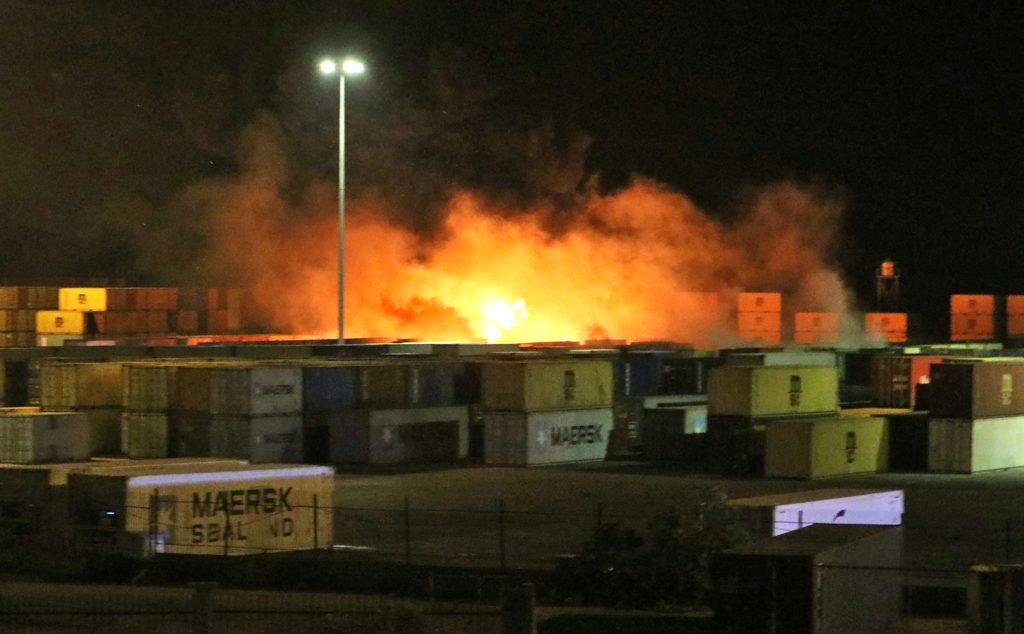The Syrian state news agency (SANA) on December 7 reported the breaking news that an “Israeli aggression had targeted the vicinity of Latakia port.” It was followed by three shorter nondetailed reports that confirmed the bombing targeted “commercial containers” and the fact that Lebanon had strongly condemned the aerial aggression.
For SANA, coverage of the event was over with the resumption of work at the Latakia Container Terminal after all damages had been removed. This is how an event, in less than 48 hours, begins and ends in a country of steadfastness and confrontation: without a military, diplomatic or even a proper media response.
“No one wants a war in Syria,” said the Russian president’s special envoy to Syria, Alexander Lavrentiev, at a forum in Damascus in mid-November. As if the ongoing conflict does not exist. “No one wants a war with Israel in Syria” may be a more accurate statement.
The coverage completely ignored the “axis of resistance,” which in the event of the Latakia bombing is arguably an indication of its importance. Especially seeing the fact that the attack took place in an utterly unexpected place.

It was the first time Israel bombed the port of Latakia, which is operated by Iranian companies. In 2019, after a visit by Syrian President Bashar al-Assad to Tehran, a contract concerning the port was signed with Iran. This greatly upset Russia, which had hoped to control the entire Syrian coast.
“Don’t be afraid, Israel doesn’t bomb civilians,” an Assad loyalist wrote to reassure the people of Latakia during the Israeli bombing.
This phrase shows the implicit recognition that there is another aircraft targeting civilians in Syria, as it shows the Syrians’ awareness of the rules of the Iranian-Russian-Israeli game in Syria, because everyone knows that Israel is bombing civilians, but not in Syria, not now at least.
The Israeli bombing reveals the tension that exists in areas under control by the Assad regime, largely due to the Russian and Iranian presence and the hidden conflict between them. The Syrian people increasingly begin to feel the weight of their presence on an economic and social level, and even in terms of security.
Circles close to the Assad regime have spoken explicitly about Russian-Israeli coordination regarding the Latakia bombing. Air defenses were disrupted and no S-400 missiles, which are located at the Russian-operated Khmeimim Air Base some 20 kilometers from Latakia, were not fired.
As the bombing melted the containers in the port, images of empty rice and coffee bags were broadcasted by Syrian state media. The bags were apparently not affected by the heat of the explosion.
The Syrian people were furthermore offered pictures of previous bombings targeting locations in Damascus. If the regime aimed to sow fear and terror in the hearts of the Syrians, and to prove its claim that it is fighting terrorist organizations with those old images, today it also seems to seeks to hide what was actually targeted in Latakia.
Be it the manufacturing of drones, a weapons shipment, missiles for the Iranian militias, or a drug shipment being prepared in the port of Latakia, which is one of the country’s most important drug trafficking centers, constituting a prominent source of income for the Iranian militias.
With the most recently broadcasted images the Assad regime aimed to confirm that what was bombed by the Israeli jets were food storage facilities, which may help justify the current crazy prices in Syria.
Yet, it ignores the Russian complicity in the Israeli bombing. Israel cannot bomb a target so close to Russia’s largest base in Syria without informing Moscow. It is a red line that was reactivated following the meeting between Russian President Vladimir Putin and Israeli Prime Minister Naftali Bennett on October 30.
And thus Russia is in fact one of the parties conspiring against Syria. This is what is currently being circulated on pro-regime social media and networking sites.
The festivities celebrating the victory over the Israeli enemy, which we usually see after each bombing, disappeared. And for the first time the comments of some Assad loyalists were similar to those opposing him. They criticizing the regime’s silence and Russian complicity with Israel, as well as the Iranian presence in the country that triggers the bombing and destruction of the country.
These voices may not yet be loud enough, while many may maintain a safe distance to avoid being heard out of fear for arrest, or worse, but their presence constitutes a common factor that must be built upon.
In every town and city in Syria under the control of the regime, or any other de-facto authorities, there is a growing resentment of war and foreign military forces, and an overwhelming desire to find a solution to guarantee a minimum level of stability and security.
Read Also:







